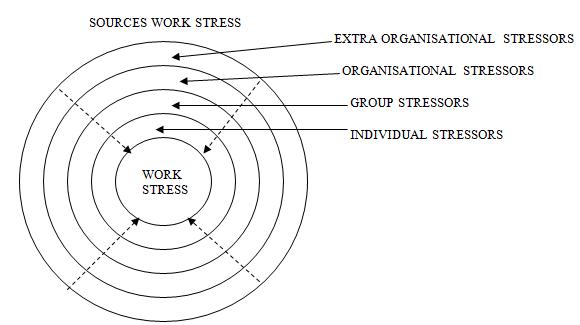Stress is a reality of our everyday life. There are both distresses and distresses that come from our work and non work lives. It was pointed that the work and non work domains of one’s life are closely interrelated. Thus, if one experiences much distress at work, that stress will be carried over to the home, which will increase the sense of awareness of even small distresses experienced in a family sphere. Likewise, stresses experienced at home or with friends or from other non work situations can be carried over to the work place which might heighten and multiply the stresses experienced at work.… Read the rest
Stress Management
Introduction to Stress Management
In today’s changing and competitive work environment, stress level is increasing both in the workers as well as the managers. As a result of this work stress, more and more managers are showing signs of chronic fatigue and burnout. Research has concluded that stressed out managers are not good for their companies or shareholders. In most cases, stress leads to reduced efficiency in even the best of individuals, which in turn leads to reduced productivity. Stress is a problem in almost all the countries of the world, irrespective of whether the economy is strong or weak. Therefore, it become very essential to include “work stress” as one of the chapters in studying human behavior, because we must know what is actually stress, what are the causes of stress, what are its consequences and then, what should be done to reduce it.… Read the rest
Tips for Managing Stress
Stress management is the need of the hour. However hard we try to go beyond a stress situation, life seems to find new ways of stressing us out and plaguing us with anxiety attacks. Moreover, be it our anxiety, mind-body exhaustion or our erring attitudes, we tend to overlook causes of stress and the conditions triggered by those. In such unsettling moments we often forget that stressors, if not escapable, are fairly manageable and treatable.
Stress, either quick or constant, can induce risky body-mind disorders. Immediate disorders such as dizzy spells, anxiety attacks, tension, sleeplessness, nervousness and muscle cramps can all result in chronic health problems.… Read the rest
Coping with Stress at Work place
With the rapid advancement of technology, the stresses faced at work have also increased. Many people dread going to work, hence the term “Monday Blues”. What is the reason for this? There is partly the fear from being retrenched in bad times, leading to greater job insecurity on the part of those who remain. Undoubtedly, occupational stress is one of the most commonly cited stressors faced by people all over the world.
Stress refers to the pressure and reactions to our environment which results in psychological and physical reactions. Whilst some stress is good for motivation and increasing efficiency, too much stress can result in negative impacts such as reduced effectiveness and efficiency.… Read the rest
Different Types of Stress
Stress has often been misunderstood to be negative, with few people acknowledging the importance and usefulness of positive stress. In our everyday lives, stress is everywhere and definitely unavoidable; hence our emphasis should be on differentiating between what is good stress, and what is bad. This will help us to learn to cope with negative stress, and harness the power of positive stress to help us achieve more.
Read: What is Stress?
There are 4 main categories of stress, namely eustress, distress, hyper stress and hypo stress. Negative stress can cause many physical and psychological problems, whilst positive stress can be very helpful for us.… Read the rest
What is Stress?
Stress is a biological term which refers to the consequences of the failure of a human or animal body to respond appropriately to emotional or physical threats to the organism, whether actual or imagined. It includes a state of alarm and adrenaline production, short-term resistance as a coping mechanism, and exhaustion. It refers to the inability of a human or animal body to respond. Common stress symptoms include irritability, muscular tension, inability to concentrate and a variety of physical reactions, such as headaches and accelerated heart rate.
The term “stress” was first used by the endocrinologist Hans Selye in the 1930s to identify physiological responses in laboratory animals.… Read the rest

